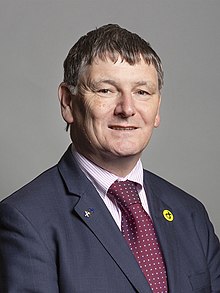Peter Grant – 2022 Speech on the Health and Social Care Levy (Repeal) Bill
The speech made by Peter Grant, the SNP MP for Glenrothes, in the House of Commons on 11 October 2022.
I do not often say this, but I welcome the decision that the Government have taken, which is to U-turn on their increase in national insurance contributions, although I utterly reject any suggestion that it should be coupled with any watering down of the previous commitments on funding for health and social care services.
I do not think that national insurance is the right name for this tax. It is an income tax—a jobs tax—and we should be honest about what it is doing. It is a jobs tax because if a person has a job, they pay tax on the money that they get paid for doing their job— unless they are earning way below the minimum full-time wage. If they are an employer, they pay tax on the wages that they pay someone for doing the job for them. It is only if a person is lucky enough to be able to make most of their money from owning shares or property that they can earn significant amounts of money without paying national insurance on that income. I have to say that not many of my constituents who are struggling on a minimum wage and part-time jobs are that impressed by the fact that they can get national insurance-free income from their share portfolios, because they cannot afford to buy them in the first place.
This is a form of income tax—a jobs tax—specifically targeted at working people. It is not even an insurance as such. I pay insurance on my car. If I am involved in an accident, I have a guarantee that the insurance company will pay its share of the costs. People do not get that guarantee just because they have been paying national insurance contributions all their life. Just ask the WASPI women—of the Women Against State Pension Inequality Campaign—how much of an insurance scheme guarantee they actually get from national insurance.
The legislation that we are being asked to repeal today—and it looks like it will be repealed today without a Division—introduced a form of hypothecated tax, which is not something that I would generally support. Nobody has really mentioned that in this debate, and it did not get much coverage in the debate last year. Other than for very time-limited and precisely defined purposes, hypothecated taxes do not really work. Filling in a small part of the decades-long underfunding in some of our most important public services is neither time limited nor specific.
Whatever we are going to do to change the tax system to get adequate funding for these services, a single, specific hypothecated tax is never going to be it. I have been consistent on this. I find it interesting that nobody who has spoken in this debate in favour of repealing the levy has explained why they voted for it in the first place last year. I note that sometimes people are allowed to change their minds regularly, whereas at other times people are not allowed to change their minds from eight years ago.
Our health and social care services are among our most precious public services. Universal healthcare—including free prescriptions—free at the point of delivery, based only on clinical need rather than the ability to pay, is surely an essential part of any civilised society. I would say the same about social care. I am proud that in Scotland we have free personal care for those who need it, regardless of whether they can afford to pay for it. I welcome the steps that the Scottish Government have taken to reduce the financial burden on those who need other forms of social care as well. All of these services are available to everybody and they should be paid for by everybody according to our means through general taxation. I am not ashamed to say that if I had to pay a wee bit extra tax that I could easily afford in order to provide a civilised society for my people to live in, I would do so willingly.
Those principles are now under direct attack, even more so than they were under the previous Prime Minister, and even more so than they were in the dark days of Margaret Thatcher. We now have a Prime Minister who has chosen to surround herself with people whose links to the NHS privatisation lobby are not hard to find. It does not need to be direct privatisation; it is very easy to privatise the health service by stealth, simply by strangling it of funds so that the waiting list becomes so long that people choose to pay for a health service that they have already paid for through their taxes.
That is why it is essential that we get a commitment from this Government that not only will there not be a reduction in cash terms in health service funding or in social care funding, but that those budgets will increase by enough to cover the cost of inflation as it hits those services. Historically, inflation in the health service has usually been higher than the headline rate of inflation. The headline rate of inflation is savage enough just now. It is likely that the true cost of inflation to the health service is even higher. I asked the Chancellor about this directly a few weeks ago when he issued his mini-Budget. Scandalously, he refused to give a commitment that funding in the health service will even keep pace with inflation, never mind increasing to meet what we can all see is an unmet demand.
Part of the reason that the NHS is coming under unprecedented pressure is that the policies and deliberate choices of this Government and their predecessors have forced people into poverty and destitution, and that has an impact on people’s health, which creates additional demand on the NHS. As others have pointed out, having people on health service waiting lists unable to work damages the economy. If the economy is damaged in such a way that it affects the funding of the health service—if, for example, people are given lower wages, are put under financial stress and are unable to afford the cost of living—that in turn damages our health, and to an extent that we perhaps have not properly realised until recently.
A recent study by the University of Glasgow and the Glasgow Centre for Population Health found nearly 335,000 excess deaths in the UK in the past seven years that were caused by austerity. Deliberate policy choices by this and previous Tory Governments since 2012 have killed more people than the covid pandemic. That is a scandalous thing to happen in any country that claims to be civilised. That is why we cannot fully consider the provisions of this Bill, or the provisions of the Act of Parliament that it seeks to repeal, in isolation from the wider policies of a Government who seem hellbent on plunging even more people into poverty, while lining the pockets of their own billionaire supporters and donors.
To give just one example, the Chief Secretary to the Treasury was delighted to tell us earlier that the combination of not increasing the national insurance levy and the previously announced changes to income tax thresholds will amount to a whopping £500 per year back in the pockets of my lowest-earning constituents. They are paying between £1,200 and £1,500 a year more just for the heat in their homes compared with last year, so the generous £500 a year that the Government are putting back into their pockets is less than half of what my constituents need just to stand still for electricity and gas prices. That is before they start to pay their increased costs of food, rent and mortgages for those able to buy their own homes.
That should not be inevitable. My constituents live in a country in which 85% of energy does not come from gas, so why do they see their bills doubling when there is a gas shortage? My constituents live in a country that supplies more energy than it needs and has a commodity that is in short supply, so why are they so much worse off when the value of the commodity that we have in surplus increases on the global market? Those are not questions that Treasury Ministers or other Ministers in this place do not know the answers to; they are questions that they are scared to face up to the answers to.
Repealing this legislation when the ink is hardly dry on the paper serves to illustrate yet again the total chaos that this Government are in. That chaos has spread to the whole of these islands, and they seem quite happy to inflict it on the financial markets, despite the impact they know it will have on people’s standard of living now and the pensions they will be able to rely on in the future.
The Government’s persistent refusal to provide a costed plan to ensure sufficient and sustainable funding for those vital services, directly through funding in England and indirectly through Barnett consequentials on the devolved nations, and their persistent refusal to put health and social care services on a proper and sustainable funding basis demonstrate clearly that our national health service can never be safe in the hands of this or any other Westminster Government.


